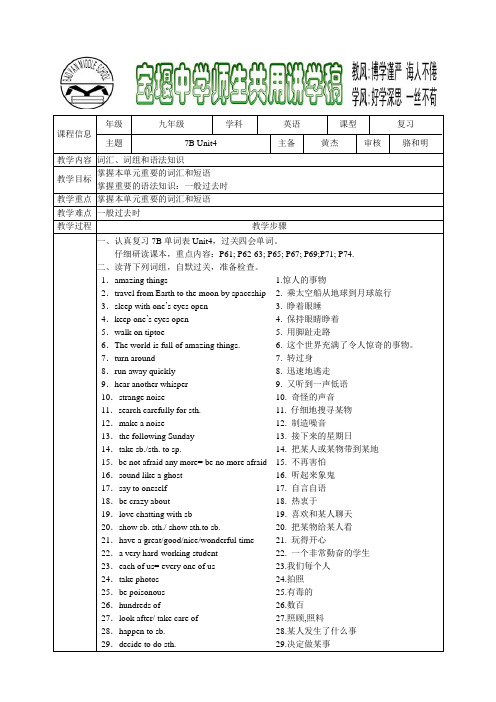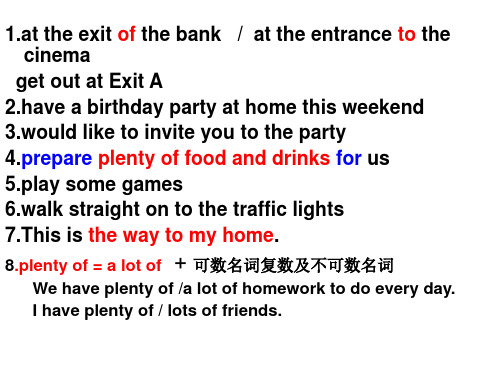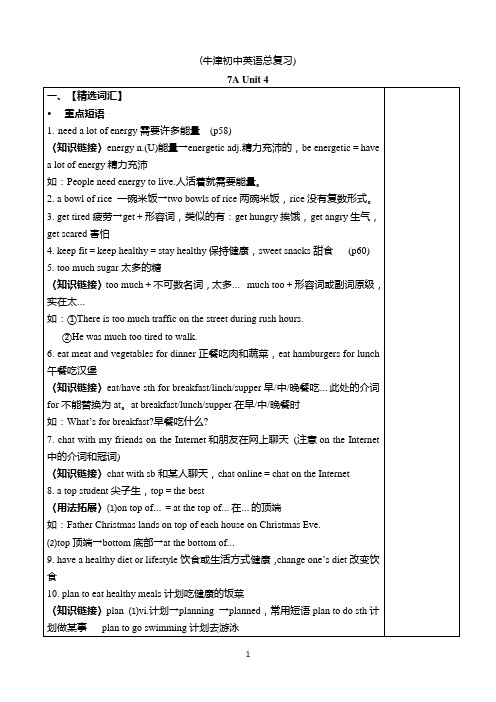苏教版中考英语复习各单元要点7B U4
- 格式:doc
- 大小:67.50 KB
- 文档页数:8


江苏新版牛津英语7BUnit4知识点Unit 4知识点Comic strip1.Follow me, Eddie. 跟着我,Eddie。
follow (v.) 跟随,后面直接跟表示人或事物的名词作宾语,相当于come after。
e.g: Spring follows winter. 冬去春来。
[拓展] follow (v.) 效仿;理解;服从e.g: As students, we should follow the school rules. 作为学生,我们应该服从校规。
He speaks too fast. I can’t follow him. 他说得太快了。
我听不懂。
[提醒] follow形容词为following,“接着的,下列的”。
e.g: Which of the following sentence is right? 下列哪个句子是正确的?2.Are you sure, Hobo? 你确定吗,Hobo?be sure “确信,有把握”,指有把握的判断。
常用短语: be sure to do sth. 肯定会做某事be sure of/about sth. 确信某事,对某事有把握be sure + that从句对……肯定/有把握e.g: You are sure to enjoy the film. 你一定会喜欢这部电影的。
Are you sure of the result? 你对结果有把握吗?I’m sure that smoking is not good for your health. 我确信吸烟对你的健康无益。
[拓展] sure (adv.) 当然可以,相当于certainlye.g: --May I use your bike? --Sure./Certainly. --我可以用你的自行车吗?--当然可以。
3.Let’s go down here. 让我们在这儿向下走。



苏教版译林版初中英语各年级知识点,推荐文档7A Unit1This is me!Unit2Let’s play sports! Unit3Welcome to our school! Unit4My dayUnit5Let’s celebrate!Unit6Food and lifestyles Unit7ShoppingUnit8Fashion7B Uint1Dream homesUnit2NeighboursUnit3Welcome to Sunshine Town Unit4Finding your wayUnit5Amazing thingsUnit6Outdoor funUnit7AbilitiesUnit8Pets8A Unit1FriendsUnit2School lifeUnit3 A day outUnit4Do it yourself Unit5Wild animals Unit6Bird watching Unit7SeasonsUnit8Natural disasters8B Unit1Past and presentUnit2TravellingUnit3Online toursUnit4 A good readUnit5Good manners [彬彬有礼]Unit6Sunshine for allUnit7International charities [国际慈善机构] Unit8 A green world9A Unit1Know yourselfUnit2ColoursUnit3Teenage problemsUnit4Growing upUnit5Art worldUnit6TV programmesUnit7FilmsUnit8Detective stories [侦探小说] 9B Unit1AsiaUnit2Great people Unit3Robots Unit4Life on Mars7A 1动词be的一般现在时2行为动词的一般现在时3人称代词4表示时间的介词5频度副词6特殊疑问句7可数名词和不可数名词8用some和any表示数量9 there be结构10 现在进行时7B 1 基数词2 序数词3 一般将来时(will shall)4 一般将来时(be going to)5 名词所有格6 形容词性物主代词和名词性物主代词7 冠词 a an the8 方位介词9 一般过去时(1)10 一般过去时(2)11 情态动词can could may12 What How 感叹句13 形容词14 不定代词8A 1 形容词比较级和最高级2 数量的比较3 副词比较级和最高级4 as…as的用法5 反身代词6 祈使句7 用should和had better提建议8 情态动词may 的用法9 动词不定式作宾语10 动词不定式作目的状语11 动词不定式作宾语补足语12 动词及五种基本句型13 连系动词14 行为动词15 过去进行时16 when while 和as的用法8B 1 现在完成时Ⅰ2 现在完成时Ⅱ3 现在完成时Ⅲ4 疑问词+动词不定式5 must/have to的用法6 enough to 的用法7 too…to的用法8 It is +adjective(+for…/of…)+to-infinitive等句型9 被动语态的一般现在时和一般过去时10 被动语态Ⅱ9A 1 并列连词and、but、or和so2 并列连词3 that引导的宾语从句4 if或whether引导的宾语从句5 连接代词和连接副词引导的宾语从句6 提建议的句型7 while引导的时间状语从句8 until引导的时间状语从句9 as soon as和whenever引导的时间状语从句10 Because引导的原因状语从句11 since和as引导的原因状语从句12 if引导的条件状语从句13 unless引导的条件状语从句14 although和though引导的让步状语从句15 so…that 和such…that引导的结果状语从句16 so that 引导的目的状语从句17 限制性定语从句和关系代词9B 1 代词it的用法2 时态3 一般现在时和现在进行时4 一般过去时和过去进行时5 一般过去时和现在完成时6 简单句和复合句之间的转换(一)7 简单句和复合句之间的转换(二)。

(牛津初中英语总复习 )7B Unit 4一.【优选词汇】㈠要点短语1.a UFO 一个不明飞翔物 , UFO 全写为 Unidentified Flying Object, UFO 的复数为 UFOs (p60)2.sleep with their eyes open睁眼睡觉→介词短语 with eyes open 作陪伴状态 (p61)〈知识链接〉 with sth+介词短语或形容词,作陪伴状态。
e.g. ①He sleepswith windows closed. ② Miss Yang came in with a big smile on her face.3. sneeze and keep your eyes open at the same time打喷嚏时睁着眼睛〈知识链接〉 keep sth+形容词,形容词作宾语补足语, e.g. keep the roomclean and tidy〈用法拓展〉形容词作宾补有: make+宾语+形容词, find +宾语+形容词,think+宾语+形容词。
e.g. ① What makes you happy?②We find Englishuseful.4.walk on tiptoe 用脚尖走路→ on tiptoe 用脚尖, on foot 步行。
注意此处这两个名词不可以用复数。
5.one Sunday morning 一个礼拜天的清晨, one在时间状语中,前方不能加介词。
(p62)6. as usual像平时同样→ than usual比平时更 (这两个短语不可以用usually)〈知识链接〉usual→ usually,usual反→义词unusual, usually反→义词unusually e.g.①This morning she got up early as usual. ②This morning he got up earlierthan usual.7.hear a whisper from the bushes behind the tree听到树后灌木丛传来低语声〈知识链接〉⑴ whisper ⑴ vi. 低语 e.g. She whispered in his ears.⑵n.低语=a soft noise (常用复数 whispers) e.g. They were talking in whispers.⑵f rom the bushes 从灌木丛→ in the bushes在灌木丛中8. search carefully认真搜寻〈知识链接〉search ⑴vt.搜寻;搜身,e.g. search sp搜寻某地,searchsb 搜某人的身。
苏教版(译林版)初中英语各册单元语法点复习梳理教材单元Unit 1 This is me!Unit 2 Let ’ s play sportsUnit 3 Welcome to our school7AUnit 4 My dayUnit 5 Let ’ s celebrate!Unit 6 Food and lifestyleUnit 7 ShoppingUnit 8 FashionUnit 1 Dream homesUnit 2 NeighborsUnit 3 Welcome to SunshineTown!7BUnit 4 Finding your wayUnit 5 Amazing thingsUnit 6 Outdoor funUnit 7 AbilitiesUnit 8 PetsUnit 1 FriendsUnit 2 School life8AUnit 3 A day outUnit 4 Do it yourselfUnit 5 Wild animals复习自评主要语法项目(备注)Simple present tense of theverb to beSimple present tense of theverb to doA:Personalpronouns(subject form)B:Personalpronouns(object form)A:Prepositions of timeB:Adverbs of frequencyAsking Wh- questionsCountable anduncountable nounsA:Using some/anyB:Using there be Presentcontinuous tenseA:Cardinal numbersB:Ordinal numbersA:Simple future tense withwill and shallB:Simple future tense withbe going toA:Noun + ’ sB:Possessive adjectivesand pronounsA:Using a, an and theB:Prepositions of placeSimple past tense(I)Simple past tense(II)A:Using can, could and mayB:Using What and Howto express strong feelingsA:Using adjectivesB:Indefinite pronounsComparative andsuperlative adjectivesA:Comparing the amountof thingsB:Comparative andsuperlative adverbsA:Using as...asB:Reflective pronounsA:Giving introductionsB:Using should and had betterA: Using may for possibility8B 9A Unit 6 BirdwatchingUnit 7 SeasonsUnit 8 Natural disastersUnit 1 Past and presentUnit 2 TravellingUnit 3 Online toursUnit 4 A good readUnit 5 Good mannersUnit 6 Sunshine for allUnit 7 International charitiesUnit 8 A green worldUnit 1 Know yourselfUnit 2 ColoursUnit 3 Teenage problemsUnit 4 Growing upUnit 5 Art worldUnit 6 TV programmesUnit 7 FilmsB:Using verbs +to-infinitiveA:Using to-infinitive forpurposeB:Using verbs+ to-infinitivesVerbs and sentence structuresA:Past continuous tenseB:Using when,while and asPresent perfect tenseA: Using have/has beenand have/has goneB: Verbs with for and sinceSimple past tense andpresent perfect tenseA:Using questionwords +to-infinitivesB:Using must and haveto A Using enough toB Using too...toA:It is+adjective+ to –infinitiveB:It is +adjective+ for ...+to-infinitiveC:It is + adjective +of ...+to-infinitive Passivevoice in the simple presentand past tenses Passivevoice in the simple futuretenseA:Using and, but, or and soB:Using both ... and ..., notonly ... but (also) ..., either ...or ... and neither ... nor ...A:Object clauses introduced bythatB:Object clauses introducedby if or whetherA:Object clauses introduced byquestion wordsB: Giving suggestionsA:Using before, after, whenand whileB:Using since, till and untilC:Using as soon as andwheneverA:Giving reasons with becauseB:Giving reasons with sinceandasA:Using ifB:Using unlessA: Using although/thoughB: Using so ... that and such ... thatC: Using so thatUnit 8 Detective stories A Defining relative clausesB Relative pronouns Uses of itA: Using it as a pronounUnit 1 Asia B: Using it as a impersonal pronounC: Using it to replace the real subject or objectTensesA: Simple present and present continuousUnit 2 Famous people B: Simple past and pastcontinuousC: Simple past and presentperfect9B SentencesA: Using object clauses orobjects + object complements Unit 3 Robots B: Using object clauses orquestion words + to –infinitivesC Using adverbial clauses orto-infinitiveSentencesA: Using adverbial clausesor simple sentencesUnit 4 Life on Mars B: Using object clauses orsimple sentencesC:Using defining relativesclauses or simple sentences。
牛津英语7B Unit 4 词组和句型总结1. A UFO 一个不明飞行物2.From earth to the moon从地球到月球e on 加油/ 过来4. 2.72 metres tall 2.72米高/ a 2.72- metre –tall man 一个2.72米高的人5.Keep your eyes open 使你的眼睛睁着。
6.At the same time 同时7.Walk on tiptoe垫着脚尖走8.As usual 像往常一样的9.Hear a whisper from the bushes 听到一阵来自灌木丛的低叫声10.In the bushes. 在灌木丛里11.Turn around 转身12.Something unusual / anything unusual 一些不寻常的东西13.Listen carefully仔细听14.Search carefully仔细搜索15.Say to himself自言自语16.Make a sound like a whisper发出一种像耳语的声音17.Sound like a ghost听起来像鬼叫的声音18.Show them the ghost / show the ghost to them.给他们看鬼怪19.On their way to …在他们去。
的路上20.Take care of / look after 照顾照看。
21.The following Sunday接下来的星期天。
22.Have a great time doing 做。
很开心23.Be crazy about sth / doing sth.对。
痴迷24.Kick a stone 踢石子25.Be fond of music热衷于音乐26.Very few of them 他们中的极少人27.Wake me up 把我叫醒28. A hard-woking student.一个勤奋的学生29.Practice doing 练习做。
Unit4 Finding your way重要单词、短语treasure un.宝藏find treasure寻宝lie v. 躺;位于现在分词lying lie down躺下,躺着follow me / come with me跟我来have to do sth 不得不做某事go up/ down 上去/下去go on a trip = have a trip进行一次旅行a trip to sp. 去某地的旅行 a trip to the zoo 一次去动物园的旅行go to sp. for our class trip 到某地去举行我们班的郊游all day long整天walk along/down the street沿着街道步行turn left向左转in an open area在户外half an hour later半小时后be dangerous to sb 对某人是危险的clever and funny 又聪明又滑稽jump around 跳来跳去be like open fans 像打开的扇子all kinds of animals 各种各样的动物have a nice trip 旅行愉快Not bad.还不错an English Corner 一个英语角at the corner of the street在街道的拐角处on your left在你的左边plenty of food and drinks大量的食物和饮料the way to my home去我家的路take the underground乘地铁get out at Exit A 在/从A出口出来the exit to ……的出口get into/ out of the car 上/下小汽车重要句型1.Are you sure, Hobo?sure确信,有把握be sure to do sth. 一定会做某事be sure of/about sth.对某事有把握be sure+that从句确信……;相信……You are sure to fail if you do it that way.Are you sure of the time?Can we be sure that she's right?2.Sunshine Zoo is north of Sunshine Middle school.east(东) west(西)north(北)south(南)south-east (东南) south-west (西南) north-east(东北) north-west (西北),A is east/south/west/north ofB A在B的……方向=A is to/on the east/south/west/north of BNanjing is west of Shanghai=Nanjing is to the west of Shanghai.【拓展】表示方位的介词in, on与to 的区别in在里面,to不接壤,on两地接壤Jiangsu is in the east of China.Russia is on the north of China.Japan is to the east of China.3.Here we are in front of the South Gate.in front of 在某物外部的前面in the front o 在某物内部的前面The teacher is having the lesson in the front of the classroom.There is a tree in front of the classroom.4.Go straight on, and you'll find the Panda House.祈使句+and/ or+一般将来时句子Use your head and you’ll find a good idea. 动动脑筋,你就会找到好主意。
(牛津初中英语总复习)7B Unit 4一.【精选词汇】㈠重点短语1. a UFO一个不明飞行物, UFO全写为Unidentified Flying Object, UFO的复数为UFOs (p60)2. sleep with their eyes open睁眼睡觉→介词短语with eyes open作伴随状态(p61)〈知识链接〉with sth+介词短语或形容词,作伴随状态。
e.g. ①He sleeps with windows closed. ②Miss Yang came in with a big smile on her face.3. sneeze and keep your eyes open at the same time打喷嚏时睁着眼睛〈知识链接〉keep sth+形容词,形容词作宾语补足语,e.g. keep the room clean and tidy〈用法拓展〉形容词作宾补有:make+宾语+形容词,find+宾语+形容词,think+宾语+形容词。
e.g. ①What makes you happy? ②We find English useful.4. walk on tiptoe用脚尖走路→on tiptoe用脚尖,on foot步行。
注意此处这两个名词不能用复数。
5. one Sunday morning一个星期天的早晨,one…在时间状语中,前面不能加介词。
(p62)6. as usual像往常一样→than usual比往常更…(这两个短语不能用usually)〈知识链接〉usual→usually,usual→反义词unusual,usually→反义词unusually e.g.①This morning she got up early as usual. ②This morning he got up earlier than usual.7. hear a whisper from the bushes behind the tree听到树后灌木丛传来低语声〈知识链接〉⑴whisper ⑴vi.低语 e.g. She whispered in his ears. ⑵n.低语=a soft noise (常用复数whispers) e.g. They were talking in whispers.⑵from the bushes 从灌木丛→in the bushes在灌木丛中8. search carefully仔细搜索〈知识链接〉search ⑴vt.搜查;搜身,e.g. search sp搜查某地,search sb 搜某人的身。
注意:search for sb寻找某人。
e.g. ①The police searched his house.警察搜查他的房子。
②search …for…搜查某地或某人的身来寻找…e.g. They searched the house for the thief. ⑵vi. 搜寻;寻找search for…=look for… e.g. She searched for her lost key.9. make a sound like a whisper=sound like a whisper听起来像低语声10. later that day那天晚些时候→ later稍后,later on以后,latest最新的,lately最近;近来〈知识链接〉⑴See you later.回头见;回见⑵I’ll explain it to you later on.待会儿我将向你说明。
⑶最近;近来①lately用于否定句、疑问句中②recently用于肯定句中。
lately和recently都常用于现在完成时中,e.g. I haven’t heard from him lately.11. take care of=look after照顾、照料某人;保管某物〈知识链接〉take good care of=look after…well好好照顾某人,保管好某物〈用法拓展〉被动语态be taken good care of,be looked after well记住:不能丢掉介词of, after12. the following day=the next day第二天→the following…=the next…接着的…,第二…13. be/feel frightened of=be/feel afraid of=be scared of害怕…,后接名词、代词或动名词。
〈知识链接〉⑴a little afraid有点害怕⑵frighten vt.吓唬,Don’t frighten her. She is just a child.14. kick a stone or a can踢石头或罐头(p65)15. very few很少→very little很少e.g. She dislikes bananas. She eats very few of them.〈知识链接〉→just a few只有/只要几个,just a little只有/只要一点没有very a few, very a little16. take photos拍照→take a photo拍照→take a photo of sb给某人拍照(p67)17. live up to 150 years old活到150岁→live up to…活到…岁(p70)18. smell things as well as dogs can嗅觉和狗一样灵敏→ as well as sb can 和…一样好〈知识链接〉as+形容词或副词原级+as sb can/could=as+形容词或副词原级+as possible尽某人所能…;尽可能…,e.g. ①Please speak English as much as you can. ②The flowers should be watered as often as possible.19. write a thank-you letter to…给某人写感谢信→write a congratulation letter to...写祝贺信给…20. remember your words about tortoises →remember sb’s words about…记得某人说的…的话21. decide to do sth=make a decision to do sth=make up one’s mind(s) to do sth决定做某事〈知识链接〉We decided to go there again next time.=We made up our minds to… (p72)22. eat it as dinner把它当饭吃,as当作;作为→Don’t treat him as a child.别把他当作小孩儿。
23. name the food after the man以这个人的名字给该食品命名(p73)〈知识链接〉name…after…以…给…命名,e.g. People named the school after the hero.〈用法拓展〉a boy called/named Tom一个叫汤姆的男孩24. dresses made of silk and cotton丝绸和棉布做的衣服,过去分词短语作后置定语。
(p75)25. enjoy the visit to the museum →v isit vt.访问;参观(灾害、疾病)侵袭n.访问;参观〈知识链接〉⑴作动词时直接加宾语,e.g. ①I visited him the other day.②The typhoon visited Taiwan.⑵作名词时,其后加to。
①the visit to…到…的参观②be on a visit to…参观…;游览…③pay a visit to sb=pay sb a visit拜访某人⑶visiting card 名片⑷visitor n.来访者;观光者;游客→复数visitors㈡词汇解析1. strange=usual不寻常的→stranger陌生人2. “喜欢”的不同表达:①be crazy about+名词/代词/动名词,对…着迷/痴迷②love to do, love doing喜爱… ③be fond of+名词/代词/动名词,爱好…④like to do, like doing,喜欢⑤dislike to do, dislike doing不喜欢⑥hate to do, hate doing讨厌3. hard-working勤勉的,勤奋的→反义词:lazy懒惰的4. poison n.毒;毒素→poisonous adj.有毒的 e.g. ①Some mushrooms contain a deadly poison. ②poisonous gas有毒气体名词变为形容词的类似结构:danger →danger ous, humour →humorous, fame →famous5. colour TV set彩电,black-and-white TV set黑白电视机6. invent vt.发明;创造→invention n.发明物;创造物(复数inventions) →invent or n.发明家7. during ⑴prep.在…期间,只能接短语,不能接句子;e.g. ①I visited London Tower during my stay in Britain. ②during the 1990s ③during the winter ④during one’s lifetime在某人的一生中⑵during表示发生的时间,for则回答how long的问题。
e.g. She stayed in New York for a week.不作She stayed in New York during a week.二.【重点句型】1. It’s just a plane. It’s only the light on the plane. (p60)〈知识链接〉only=just仅仅,e.g. just/only a little只有一点,only/just a few 只有几个2. The world is full of amazing things. 世界充满了奇妙的事物。